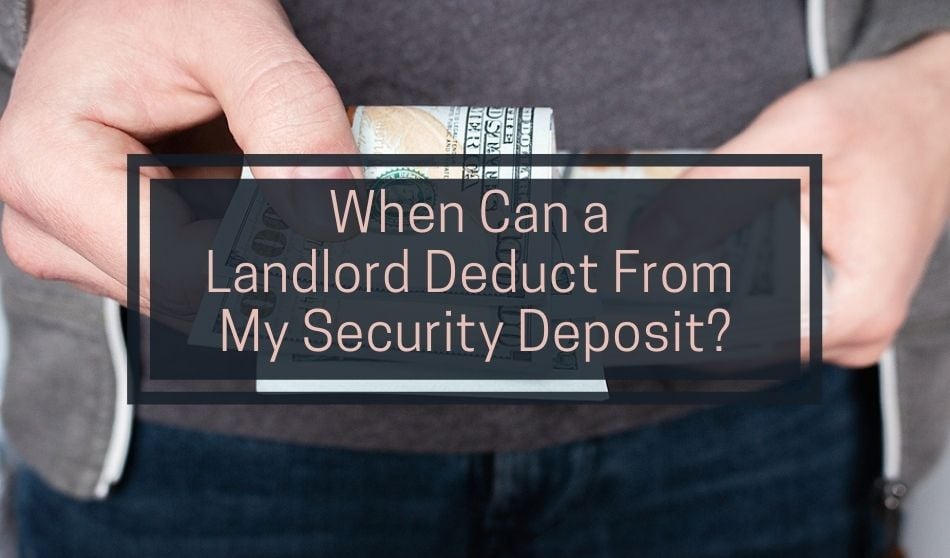If you have ever had your security deposit deducted–when you were SURE that you did everything your landlord required–you’re not alone.
In fact, according to a Rent.com survey, a surprising 1 in 4 renters have not gotten their security deposit back when they expected to. That’s 1 in 4 renters who expected a large chunk of change to help with moving expenses and, instead, were sorely disappointed.
What’s the secret? Are all landlords just charging erroneously, or do tenants tend to miss important steps? And when can a landlord reasonably deduct from a security deposit?
It is possible to demystify security deposit laws and common practices, and it is possible to get your full security deposit back at the end of your tenancy. Here are the ins and outs of when a landlord can deduct from your security deposit based on security deposit laws.
What Can a Landlord Legally Deduct a Security Deposit For:
It may seem otherwise, but generally, a landlord will want to return the full security deposit back to you because that means there was no damage or extra cleaning that needed to be done to the property. Damage takes time, money, and energy to repair. Most landlords would happily return a tenant’s security deposit knowing that the rental was well-kept during the tenancy.
Overall, most landlords will remain aboveboard with their charges. Still, when you ask for your security deposit back, it’s important to know what your landlord is legally able to charge you for. While specifics vary from state to state based on different state’s landlord-tenant laws, the general rule of thumb is this: landlords cannot charge for normal wear and tear, but they can charge for undue damage or excessive filth. Landlords can also withhold security deposit funds for nonpayment of rent, and to cover fees (as laid out in the rental agreement) related to breaching the lease.
How to Determine What is Considered Wear and Tear and What is Considered Damage:
Landlords are legally able to deduct from the security deposit in order to turn the property back into move-in-ready condition, as long as they are not charging the renter for conditions related to normal wear and tear. Renters are typically responsible for damage that is out of the ordinary. This damage can be deducted from a security deposit. Nolo lists some examples of wear and tear vs. damage, citing that issues such as sun-faded curtains, minor nicks in the wall, and moderate dirt or minimal spotting on the carpet can all be considered normal wear and tear. However, they suggest that problems like cigarette burns in curtains, large marks or holes in the wall, and rips in carpet or urine stains from pets can all be considered excessive and result in a deduction to the security deposit. Laws regarding what is considered normal wear and tear vary, so be sure to research your state and local area’s regulations.
Using Your Lease as a Roadmap:
Landlords will state exactly what their expectations are for the rental; it’s all listed in the lease agreement. Make certain that you understand the agreement before you sign, and are conscientious of the agreement during your stay in the rental. Remember, not all security deposit charges are due to direct abuse of property. Your landlord can charge for any work required to make the property look like it did before the start of the tenancy. If you do not have formal permission from your landlord, you could be charged for the living room’s new paint job, or the upgrade you made to the light fixtures. Furthermore, you could be charged for damage as a result of negligence. If you didn’t care for an appliance properly and it required repairs as a result, your landlord may be able to deduct your security deposit to pay for the fix. Be aware of the lease agreement throughout your tenancy, and be active about making sure you’ll get your deposit back.
Best Practices at Moveout:
If you know you will be moving and would like to receive your full security deposit back, there are a few tasks you can accomplish that will ensure you have a great chance of doing so. The first–and perhaps most vital–task you need to tend to is to give your landlord or property manager notice of your moveout date (in accordance with your lease agreement). Remember, you can be charged for breaking the lease early, and can be charged for an extra month when on a month-to-month lease if you do not give enough notice. Once you have given notice, the best way to ensure that your landlord is happy with the property condition is to conduct a pre-move-out inspection. During this inspection, the manager or landlord can examine the condition of the rental and list any issues that would cause a deduction from the security deposit. This allows you time to clean and repair the property, which saves your landlord or manager from needing to hire a professional and deducting the cost from your deposit.
While your lease and your manager might go over specific instructions for the property’s expected condition at move out, most often you will benefit from giving the rental a deep clean and touching up minor damage that you caused.
What to Do if Your Security Deposit Was Deducted:
There are certainly instances when a renter may not get their security deposit back, or may only receive a portion of the original deposit. If you find yourself in this position but are unsure why, it’s important to know your rights regarding your local landlord-tenant laws. Most landlords or property managers are happy to provide an account of the deductions. In fact, in most states, your landlord is supposed to explain why a deduction was made and is legally required to itemize your charges in writing. This explanation can help you learn what damages you need to avoid for the next time you rent or can help you ensure that your deposit was not erroneously deducted. If a landlord or manager attempts to charge you a verifiably unreasonable amount for a minor issue, you may have legal grounds to fight the charges.
This article was originally published in December 2018 and has since been updated







@Brentnie
Sensible article which covers all the possible points about how to safe guard their security deposit by maintaining the condition of the property well during their stay and also smartly hints the landlord that he should not charge the deposit amount for unnecessary things.
After first year we did not redo lease….so she has mentioned selling. Since 30days is required by me what time frame does she have to give? Heard 60 days bc been here 5 yrs. but scared as I have no place to go. Thx!
Hi Christina, it can be tricky finding a new rental without enough notice. The timeframe to give tenants notice to vacate on a month-to-month varies by state. I would recommend reaching out to your local housing authority to get your area specifics.
The rental had a new washer and dryer and a fridge (fridge was an older model). When the tenant moved out the appliances are gone. The washer and dryer he states broke down so he had them hauled away and the fridge he left taken apart in the garage. Are those items I can deduct from the deposit? What would be the best way to go about this? He also took the city trash can and recycle bins.
Adaluz, that sounds so frustrating that you have to deal with this situation. The appliances and city bins did not belong to the tenant nor did they have the right to make those decisions or actions. I believe all states will allow you to deduct those expenses. However, every state has its own regulations on how much you can deduct, the documentation required, limits on amounts, notifications, etc. So, I would recommend checking your state tenant-landlord laws specifically before proceeding.